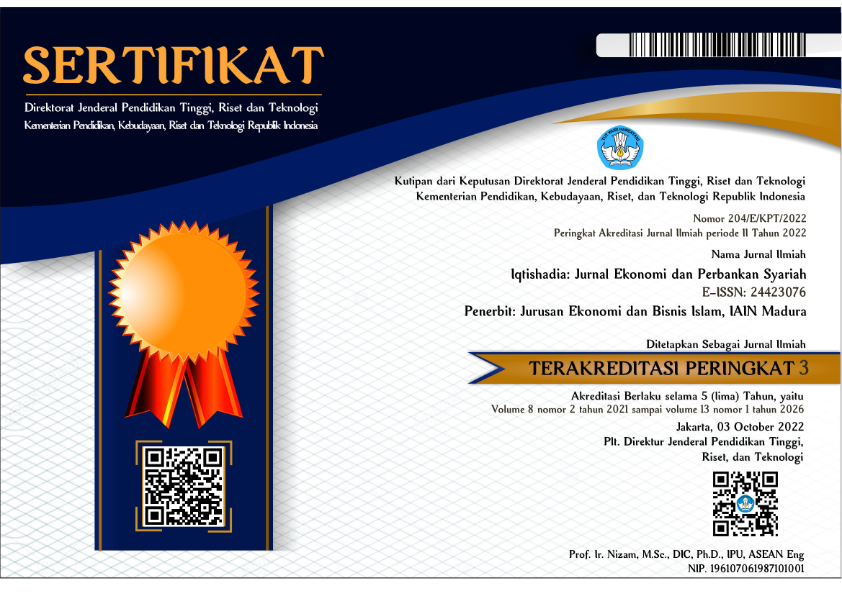The Merger of State-Owned Enterprises of Bank Syariah Indonesia in Positive Legal Review and Maqashid Syariah
 Abstract views: 370
,
Abstract views: 370
,
 PDF downloads: 360
PDF downloads: 360
Abstract
As a form of the government's participation in paying attention to and developing the market share of the Islamic economy in Indonesia, the three state-owned Islamic banks (BNI Syariah, BRI Syariah, and Mandiri Syariah) were merged into one. With the hope of being able to expand the Islamic banking market both nationally and internationally. This study aims to examine the merger of the three state-owned Islamic banks in terms of positive Law in it and to review it from the perspective of Maqashid sharia. This study uses a qualitative descriptive method by using secondary data obtained through a literature review with references from books, journals, and other literature related to this research. The results of this study indicate that the merger of state-owned banks, Bank Syariah Indonesia, is on the right track, legally positive, and in terms of Maqashid sharia. This is a step and effort by the government in maintaining and developing sharia market share in line with the maqashid sharia principle; keep and or attract good and keep away bad. In addition, some of them are launching a literacy program in understanding the concept of Islamic economics for the community so that the noble values of Islam are maintained and run in banking economic activities. However, it still requires other developments in the aspect of justice that must be initiated by BSI, of course, by continuing to carry the message of sharia in it.
Downloads
References
Andrade, G., Mitchell, M., and Staford, E. (2001). New Evidence and Perspectives on Mergers. Journal of Economic Perspectives. Volume 15 (2)—Spring. pp. 103 – 120.
Arifin, Z. (2002). Basics of Shari'a Bank Management. Second Printing. Jakarta: Alphabet.
Rise, WD. (2021). The 10 Most Muslim-Populated Countries in the World. Retrieved June 24, 2022, from https://dunia.tempo.co/read/1516427/10-negara-dengan-penduduk-muslim-terbanyak-di-dunia
Brealey, R., Myers, S., and Marcus, A. (2011). Fundamentals of Corporate Finance. McGraw-Hill Publishing Company Limited.
Devos, E., Kadapakkam, P., and Krishnamurthy, S. (2009). How do Mergers Create Value? A Comparison of Taxes, Market power, and Efficiency Improvements as Explanations for Synergies. Review of Financial Studies. Volume 22 (3). pp. 1179 – 1211.
Esterlina, P. & N. N. F. (2017). Analysis of The Company's Financial Performance Before And After Mergers And Acquisitions. Journal of Business Administration (JAB), 47(1). https://doi.org/10.31479/m.v9i1.19
Fatinah, A., & Fasa, M. I. (2021). Financial Performance Analysis, Impact of Merger of 3 State-Owned Islamic Banks and Bank Syariah Indonesia (BSI) Strategy in National Economic Development. 34(1), 11.
Gitman, L.J. and McDaniel, C. (2008). The Future of Business: The Essentials. 3th Edition. USA: Thompson Learning.
Gitman, L. J. and Zutter, C.J. (2012). Principles of Managerial Finance. 13th Edition. Boston: Prentice-Hall.
Kyriazopoulos, G., & Petropoulos, D. (2010). What are The Advantages and Disadvantages that Lead Banks into Mergers and Acquisitions? Is Altman's Z-Score Model for Bankruptcy Motivate Banks for Mergers and Acquisitions? Evidence from The Greek Banking System. Procedia Economics and Finance (Vol. 1). Retrieved from http://dx.doi.org/10.1016/S2212-5671(12)00043-3
Mahliza, F., Nugroho, L., & Ali, A. J. (2020). Antecedents and Consequences of Muslim Millennials Attitude Towards Halal Personal Care Products. IKONOMIKA, 5(2), 249–270. https://doi.org/10.24042/febi.v5i2.7203
Manurung, Mandala. Rahardja, Prathama. 2004. Money, Banking, and Monetary Economics. Jakarta: Faculty of Economics, University of Indonesia.
Nugroho, L., & Arafah, W. (2020). The Existence and Challenges of Micro, Small and Medium Enterprises (MSMEs) in the Era of Globalization. In Sumitro, A. Suroso, & S. Nurhayati (Eds.), Management of Thought Results from Higher Education Lecturers in Indonesia (Vol. First, pp. 172–187). North Sumatra: Sihsawit Labuhan Batu. https://doi.org/10.1017/CBO9781107415324.004
FSA. (2021). "OJK Officially Allows Merger of State-Owned Islamic Banks." https://www.cnnindonesia.com/ekonomi/20210127203901-78-599282/ojk-resmi-izinkan-merger-bank-syariah-bumn, Retrieved June 24, 2022.
Permana, Arief R. and Anton Purba, 2008. Review of Sharia Banking Law at a Glance. Bulletin of The Laws of The Central Bank and Bank. Vol. 6 No. 4:4.
Ross, S. A., Hillier, D., Westerield, R.W., Jafe, J., and Jordan, B. (2012). Corporate Finance. 10th Edition. USA: McGraw-Hill.
Setiawan, T., & Rusliati, E. (2020). Strengthening Capital Structure as Regulatory Fulfillment and Supporting Business Development. Journal of Temporary Accounting Research, 12(1), 43–51.
Yusendra, M. A. E., Agarina, M., Susanti, Kurniawan, H., Rahmawati, L., & Paramitasari, N. (2019). Breaking the Conventional Pattern of Higher Education Development Through Business Incubators And Breaking Technology. Proceedings of PKM-CSR, 2, 1313–1326
The journal operates an Open Access policy under a Creative Commons Non-Commercial Share-Alike license. All articles published Open Access will be immediately and permanently free for everyone to read and download.
• Creative Commons Attribution-NonCommercial (CC-BY-NC)

Iqtishadia: Jurnal Ekonomi dan Perbankan Syariah by http://ejournal.iainmadura.ac.id/index.php/iqtishadia is licensed under a Creative Commons Attribution-NonCommercial 4.0 International License.
Based on a work at http://ejournal.iainmadura.ac.id.


























